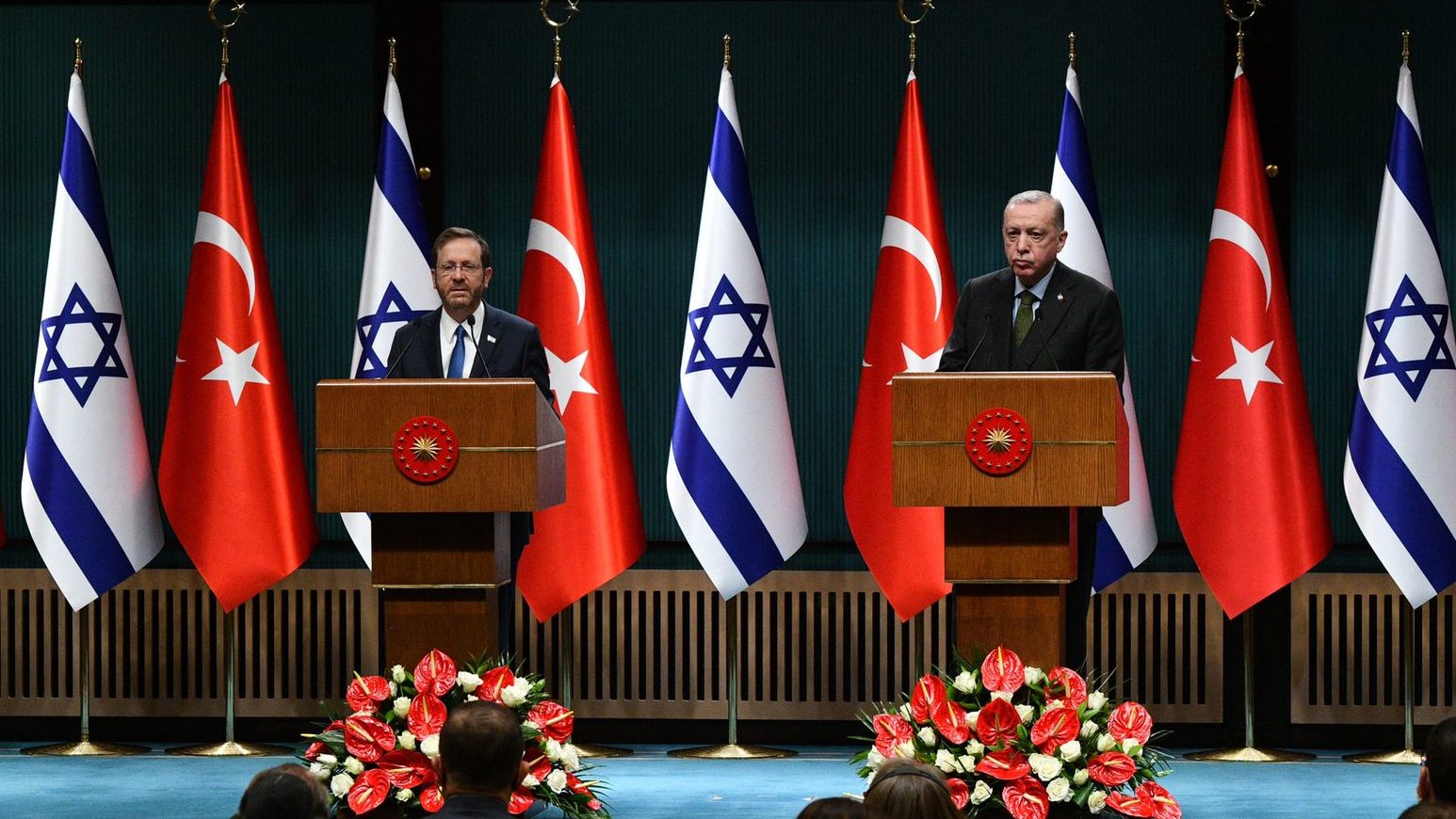Leaders of Turkey, Israel Discuss Regional Stability After Full Diplomatic Relations Restored
Erdogan, Lapid will appoint ambassadors after months of talks and visits to improve ties
Turkish President Recep Tayyip Erdoğan told Israel’s Prime Minister Yair Lapid during a phone call that he wants further cooperation to be “underpinned by mutual respect for sensitivities,” his office announced Wednesday night after the two countries agreed to restore full diplomatic relations.
After months of discussions and high-level visits on improving ties, Tukey and Israel said they would appoint ambassadors to each other’s countries. A statement from Erdoğan’s office said ambassadors would be appointed “as soon as possible.”
Lapid said during the Wednesday evening conversation with Erdoğan that improving relations with Turkey would support regional stability.
Relations between Israel and Turkey last broke down in 2018 when ambassadors were recalled from their posts over disputes about the killing of dozens of Palestinians during protests over the US moving its embassy to Jerusalem.
Erdoğan’s desire to be seen as a defender of Muslims and to appeal to the nationalist base of his Justice and Development Party also has led him to lash out at his neighbors – especially Israel, and against the US.
After a week of fighting between Israel and Palestinian groups in Gaza last year, Erdoğan said that the US had blood on its hands for selling weapons to Israel.
Soon afterward, US State Department spokesperson Ned Price issued a statement strongly condemning “recent anti-Semitic comments regarding the Jewish people” made by Erdoğan.
Michael Harari, a former Israeli ambassador to Cyprus, told The Media Line that restoring full diplomatic relations will be a boost to the West and NATO.
“I think what’s important for NATO and for Israel, is to make sure that Turkey is closer to the West than the opposite,” said Harari, who is now a policy fellow at Mitvim – The Israeli Institute for Regional Foreign Policies.
I think it’s a benefit for almost everyone to have these two countries, major actors within the region, overcome the tensions and manage to open a new diplomatic chapter
Erdoğan has been trying to improve relations with countries in the region, as well as with long-time allies who have been at odds with Turkey.
Despite being a member of NATO, Ankara has moved closer to one of the alliance’s biggest enemies, Russia, which has drawn the ire of some of Turkey’s most powerful allies, including the US.
Turkey was kicked out of a US fighter jet program due to a purchase of a Russian anti-missile air defense system, the S-400s, in 2019.
Salim Çevik, an expert on Turkey at the German Institute for International and Security Affairs, told The Media Line that he believes improving ties with the US, especially Congress, was a leading reason why Ankara wanted to restore diplomatic relations with Israel.
US President Joe Biden has said he wants his country to sell F-16 fighter jets to Turkey but the House of Representatives has not supported the move.
“Turkey [is] trying to mend fences with its former rivals and enemies,” Çevik said. “There’s nothing more to gain through confrontation.”
Anti-Western skepticism is widespread in Turkey and the government has repeatedly criticized NATO for not helping it during a failed coup attempt in 2016.
Analysts say that Erdoğan also feels threatened by a group of countries in the region, including Israel, that are cooperating in a gas forum in the eastern Mediterranean.
In the months leading up to Wednesday’s announcement, Turkey repeatedly said it wanted to cooperate with Israel on energy.
Nimrod Goren, the president and founder of Mitvim – The Israeli Institute for Regional Foreign Policies, told The Media Line that he expects energy to be part of the countries’ renewed relationship.
“I think it’s a benefit for almost everyone to have these two countries, major actors within the region, overcome the tensions and manage to open a new diplomatic chapter,” he said.
Goren added that another key topic will be Russia and its impact on the wider region, especially in Syria, where Turkey also has forces based.
Russia’s cooperation with Iran in Syria and its backing of Syrian President Bashar Assad are threats to Israel and Turkey. Even so, they both wanted to maintain ties with Russia after its full-scale invasion of Ukraine.
Kristian Brakel, head of the Turkey office for the Heinrich Böll Foundation, told The Media Line that Israel and Turkey are interested in remaining open to talking to Moscow for their own possible future military operations in Syria.
“Israel … is in a stronger position to squeeze Damascus and, with it, Russian interests in Syria, even if Russia does not green light its aerial operations. That might be an aspect that Turkey could eventually hope to leverage to its advantage,” according to Brakel.

